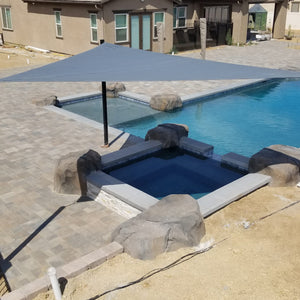
Maintaining Your Truck Tarps and Lumber Tarps
Comprehensive Guide to Maintaining Your Truck Tarps and Lumber Tarps
Maintaining your truck tarps and lumber tarps is essential for ensuring they last longer and continue to protect your cargo effectively. This guide will cover maintenance tips for different types of tarps, including lumber tarps, truck tarps, cargo tarps, flatbed tarps, and semi tarps. By following these steps, you can keep your tarps in top condition and ensure they provide the best protection for your loads.
Types of Tarps
Before diving into maintenance tips, it's important to understand the different types of tarps available for trucks and flatbeds. Here's a quick overview of the types of tarps you can find at Tarp's Tiedowns:
- Lumber Tarps: Designed specifically for covering lumber and other bulky loads.
- Truck Tarps: General-purpose tarps used for various types of cargo.
- Cargo Tarps: Versatile tarps suitable for covering different types of cargo.
- Flatbed Tarps: Tarps designed to cover loads on flatbed trailers.
- Semi Tarps: Heavy-duty tarps for semi-trailers.
Importance of Tarp Maintenance
Proper maintenance of your tarps ensures they remain durable, waterproof, and effective in protecting your cargo from the elements. Neglecting tarp maintenance can lead to tears, leaks, and other damages that compromise the safety of your load.
Maintenance Tips for Truck Tarps and Lumber Tarps
1. Regular Inspections
Keyword: truck tarp, lumber tarp
Regularly inspect your tarps for any signs of wear and tear. Look for holes, tears, frayed edges, and weakened seams. Catching these issues early allows you to repair them before they become major problems.
2. Cleaning Your Tarps
Keyword: cargo tarps, flatbed tarps
Clean your tarps regularly to remove dirt, grime, and other debris. Use a mild soap and water solution, and avoid harsh chemicals that can damage the tarp material. Rinse thoroughly and allow the tarp to dry completely before storing it.
3. Proper Storage
Keyword: tarps for trucks, tarp for flatbed
When not in use, store your tarps in a cool, dry place. Avoid exposure to direct sunlight for extended periods, as UV rays can weaken the tarp material. Roll your tarps neatly and avoid folding them to prevent creases and stress points.
4. Repairing Damages
Keyword: flatbed trailer tarps, semi trailer tarps
If you find any holes or tears during your inspections, repair them immediately. Use tarp repair kits, which typically include patches and adhesive. Ensure the area around the damage is clean and dry before applying the patch.
5. Securing Your Tarps Properly
Keyword: tarp for truck, tarps for flatbed trailers
Make sure your tarps are secured properly when covering your load. Use strong tie-downs and bungee cords to prevent the tarp from flapping in the wind, which can cause wear and tear. Properly securing your tarp also helps in tarping a load effectively, ensuring full coverage and protection.
6. Avoiding Sharp Edges
Keyword: flatbed with tarp
Avoid dragging your tarps over sharp edges and rough surfaces, as this can cause abrasions and punctures. Use edge protectors on your flatbed trailer to minimize the risk of damage when covering loads with your flatbed tarps.
7. UV Protection
Keyword: semi tarps
If you frequently use your tarps in sunny conditions, consider applying a UV-protectant spray. This will help extend the lifespan of your semi tarps by preventing UV damage, which can weaken the material over time.
8. Regular Replacements
Keyword: tarps for flatbed trailers
Even with the best maintenance practices, tarps will eventually wear out. Keep an eye on the overall condition of your tarps and replace them when they become too damaged to repair effectively. Investing in new tarps ensures your cargo remains protected.
Conclusion
Maintaining your truck tarps and lumber tarps is crucial for their longevity and effectiveness. By following these maintenance tips, you can ensure that your tarps for trucks, flatbeds, and semi-trailers remain in excellent condition, providing reliable protection for your loads. Regular inspections, proper cleaning, secure storage, and timely repairs are key to extending the life of your tarps and keeping your cargo safe.



